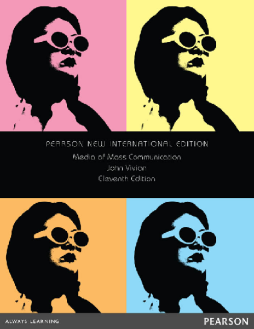
Additional Information
Book Details
Abstract
People make media, media takes up two-thirds of our waking hours, media impacts our lives; it is critical to understand how the media work and why, to grasp the global nature of communication, and to assess media messages to attain media literacy.The Media of Mass Communication, 11eteaches students to understand how the media work and why.
The material engages students as both consumers and creators of mass media. Students explore the latest media economic, technological, cultural and political shifts all in historical context. They engage with the coverage of ongoing transformations in mass media as analysts, examining the various ways in which media impacts the world as they hone their media literacy skills. Praised for its dynamic writing style, The Media of Mass Communication, 11e helps students see why the media are in such a tumultuous transition and provides tools for understanding the reshaping of the entire media industry.
- Personalize Learning–MyCommunicationLab for Mass Communication delivers proven results in helping students succeed, provides engaging experiences that personalize learning, and comes from a trusted partner with educational expertise and a deep commitment to helping students and instructors achieve their goals. With tools such as MediaShare (our video upload and commenting tool), MyOutline, and self-assessments in MyPersonalityProfile, MyCommunicationLab works with students and instructors to personalize the learning experience and make it more effective.
- Improve Skill Development and Application– Pedagogical tools including Study Preview; Chapter Wrap-Up, Review Questions; lists of key concepts, terms and people; and Media Sources help students understand central concepts and prepare for the course. Additional activities on MyCommunicationLab.com emphasize skill-building and applications.
- Engage Students– Introductory vignettes at the beginning of each chapter provide evocative stories that illustrate important issues about the mass media and provide colorful descriptions about people who contributed significantly to the mass media. “Media People” boxes profile key figures in media industries. New “Media Counterpoints” boxes explore two sides of an issue, presenting the key arguments on controversial topics and providing critical thinking questions designed to help students determine their own positions on each issue.
- Explore Examples of contemporary communication–New “Media Tomorrow” boxesaddress the impact of new technologies on media as well as the public’s changing media consumption patterns. Topics range from eyetracking tablet users’ media access to the growth of digital publications and governmental online access policies.
- Emphasize Learning Outcomes–“Media Timelines” cast key development in the mass media in a graphic chronology and place media milestones in the larger social context. To help students establish a greater framework for understanding how issues such as culture, democracy, economy, and audience fragmentation in the media, interact with each media industry differently and relate to media literacy, each chapter concludes with a highly visual “Thematic Summary.”
- Understand Theory and Research — Students also can access Pearson’s MySearchLab where they can get extensive help on the research process as well as access four databases of credible and reliable source material (for details, please see www.mysearchlab.com ). MySearchLab also contains an AutoCite feature that assists students in the creation of a Works Cited document (using APA, MLA, or Chicago formats), as well as Pearson’s SourceCheck, which encourages students to accurately document and cite their sources.
- Support Instructors– A strong supplements package along with activities and assessments in MyCommunicationLab for Mass Communication. ClassPrep, located within MyCommunicationLab, contains videos, lectures, classroom activities, audio clips, and more.
